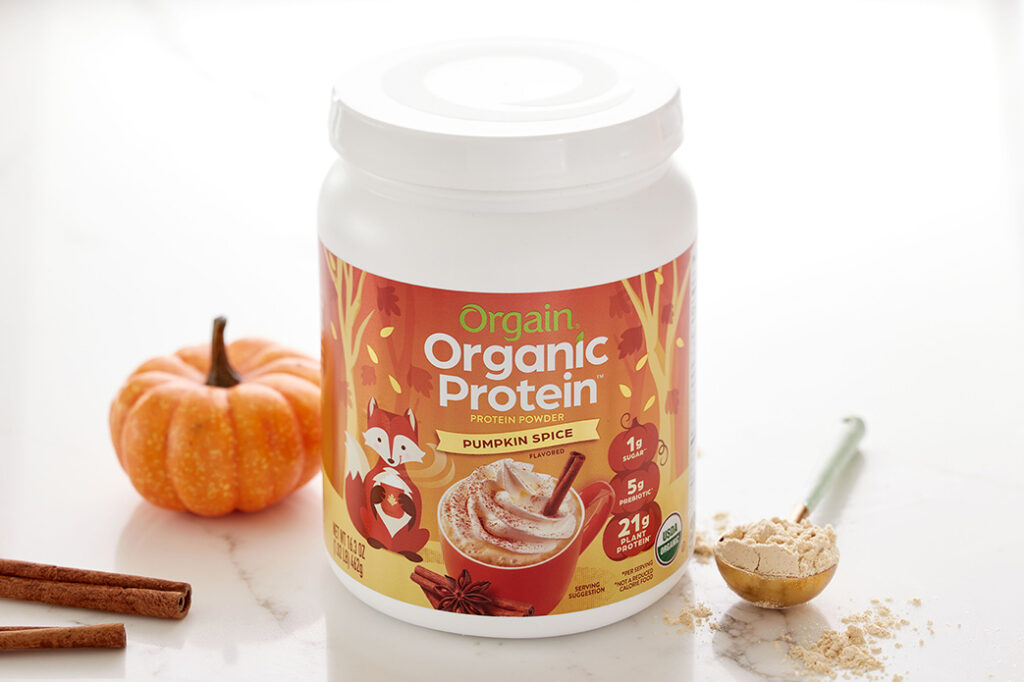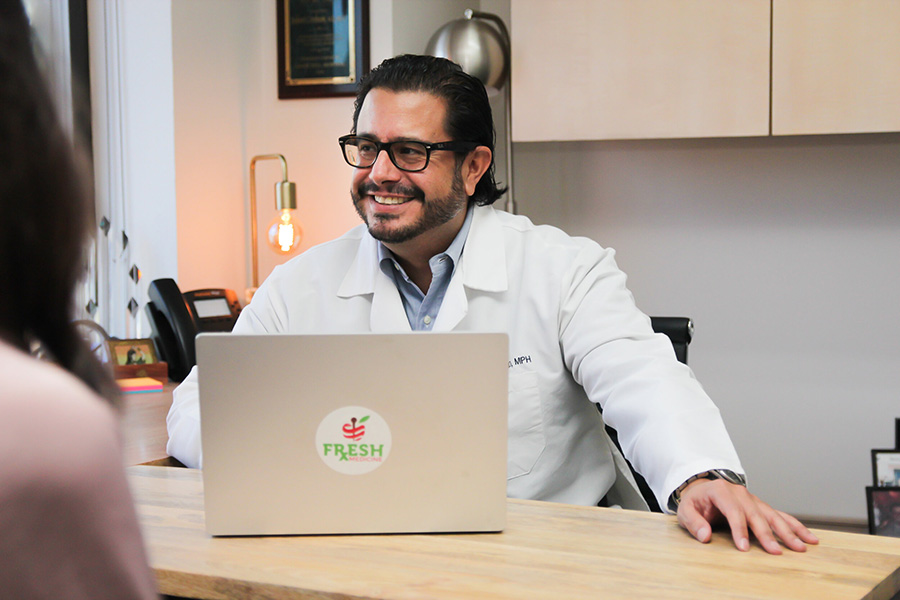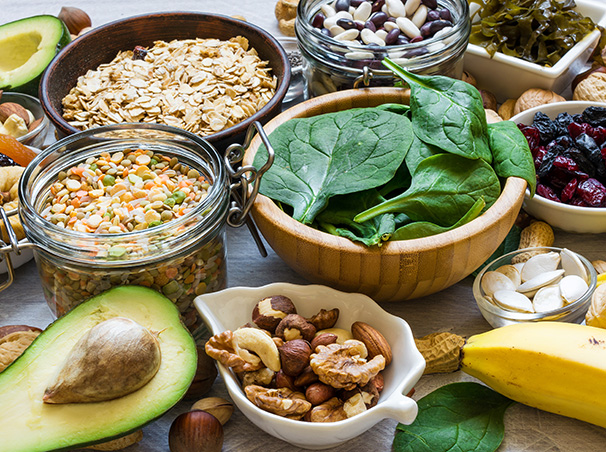Access to food that promotes health and well-being is a struggle for many people. Food as medicine (FAM) is a way for healthcare professionals (HCPs) to incorporate nutrition interventions in patient care to improve health and nutrition security.1
Choosing healthy foods is a critical component of healthcare. However, with only 38% of physicians discussing dietary intake during patient visits, nutrition is often overlooked as a strategy for improving health.2 Improving the diet can prevent one in every five deaths worldwide from non-communicable diseases such as cardiovascular disease, cancer, chronic respiratory disease, and diabetes.3,4 FAM interventions help supply food and sometimes nutrition guidance to support overall healthier dietary habits.1
Although choosing foods that promote health can help reduce the risk of certain diseases and death, it’s important to note that FAM is not a replacement for much-needed medical care from a qualified HCP and a food prescription is not intended to be a substitute for a medicine prescription.
Types of FAM Interventions
Here are four common types of FAM interventions directed by HCPs at little to no cost to the patient. These interventions may be funded by government programs, philanthropy, or the healthcare system.1 The availability of the FAM interventions described here varies by location, with Medicaid piloting programs in certain states. Non-profit organizations, such as Wholesome Wave, offer some guidance on identifying programs.
| FAM Intervention | Details | Target Population |
|---|---|---|
| Medically tailored meals | Prepared meals designed for a specific health condition. This usually includes nutrition counseling. | People with complex medical conditions, such as cancer or HIV, who are not able to shop or prepare meals. |
| Medically tailored groceries | Grocery items tailored for a specific health condition. | People experiencing food insecurity who can cook at home. |
| Produce prescriptions | Vouchers or debit cards for free or discounted produce. | People at risk for diet-related chronic disease, such as diabetes or obesity, who are experiencing food insecurity.1 |
| Culinary medicine | Personalized nutrition education with instruction on food preparation and cooking to support patients with the skills and education necessary to implement dietary recommendations.1 | People who are interested in assessing their diet and participating in a program.2 |
The Role of FAM in the Healthcare System
Health-promoting foods can have big benefits for reducing healthcare expenses, especially when used for patients dealing with cancer, diabetes, and other diseases.1,5 In an examination of over 1,000 patients, providing medically tailored meals was associated with a 16% reduction in overall healthcare costs, 49% fewer inpatient hospital admissions, and 72% fewer skilled nursing admissions.5
Lack of consistent access to nutritious foods can lead to greater intakes of lower quality foods often rich in refined carbohydrates, excess sodium, and excess saturated fat.6 Food insecurity often coexists with chronic health conditions such as obesity, and diabetes, and FAM interventions, such as produce prescriptions, have broad appeal and benefit for this population. FAM interventions can help extend food dollars and allow people to buy nutritious foods they otherwise might not be able to afford.1
Food Environment and Food Choice
Low quality food is often widely available in underserved areas.7 Patrons of food pantries in underserved areas have been found to have inadequate intake of fruits, vegetables, and whole grains and higher intakes of fatty meats, refined grains, and sugary beverages.8 A poor quality diet increases the risk of health conditions including cardiovascular disease, cancer, type 2 diabetes, and overall mortality.4,7
Dietary choices are shaped by the food environment. Prominent display of healthier food items in stores and pantries is shown to help nudge people toward these foods while allowing them to maintain freedom of choice.7 FAM interventions, such as produce prescriptions, are shown to lead to better intake of fruits and vegetables and better adherence to dietary recommendations by allowing people access to foods they might otherwise not be able to afford.1,7
The Future of FAM
Here are some ways for HCPs to address the impact of nutrition on health:
- Primary care providers can plan to discuss food and health during a patient’s annual physical.2
- When appropriate and available, HCPs can consider referring patients for medically tailored meals, medically tailored groceries, produce prescriptions, or culinary medicine.
- Identify the process for patients to utilize meals and vouchers for groceries and produce and include this information during referral. Verify and update this process as often as necessary.1
- HCPs can refer patients to a registered dietitian to provide nutrition guidance and support with cooking skills, shopping, meal planning, and food safety. The Academy of Nutrition and Dietetics Foundation, a charitable organization that supports nutrition professionals to help their clients live healthier lifestyles, developed resources and support for registered dietitians to provide nutrition-focused programs in food retail settings.9 Meeting with people while they shop for food can be an ideal way to provide nutritional support.
Eating nutritious foods has undeniable health benefits.4 Support from HCPs with FAM interventions to allow access to foods that promote health and wellbeing can be a crucial part of healthcare. Continued research on the cost-saving and health promoting benefits of FAM interventions can help ensure crucial ongoing funding.
Learn More with Orgain
To further support your knowledge on the food as medicine (FAM) movement and lifestyle medicine, check out these other Orgain-sponsored educational resources:
The Good Clean Nutrition Podcast
Episode 9: The Crusade to Make Diet a Vital Sign with David L. Katz, MD, MPH, FACPM, FACP, FACLM
Episode 29: Understanding Food as Medicine with Doctor and Chef, Robert E. Graham, MD, MPH, ABOIM, FACP
References:
- Downer S, Berkowitz SA, Harlan TS, Olstad DL, Mozaffarian D. Food is medicine: actions to integrate food and nutrition into healthcare. BMJ. 2020 Jun 29;369:m2482. doi: 10.1136/bmj.m2482. PMID: 32601089; PMCID: PMC7322667.
- Parks K, Polak R. Culinary Medicine: Paving the Way to Health Through Our Forks. Am J Lifestyle Med. 2019 Sep 11;14(1):51-53. doi: 10.1177/1559827619871922. PMID: 31903082; PMCID: PMC6933573.
- Piovani D, Nikolopoulos GK, Bonovas S. Non-Communicable Diseases: The Invisible Epidemic. J Clin Med. 2022 Oct 8;11(19):5939. doi: 10.3390/jcm11195939. PMID: 36233805; PMCID: PMC9572583.
- GBD 2017 Diet Collaborators. Health effects of dietary risks in 195 countries, 1990-2017: a systematic analysis for the Global Burden of Disease Study 2017. Lancet. 2019 May 11;393(10184):1958-1972. doi: 10.1016/S0140-6736(19)30041-8. Epub 2019 Apr 4. Erratum in: Lancet. 2021 Jun 26;397(10293):2466. PMID: 30954305; PMCID: PMC6899507.
- Berkowitz SA, Terranova J, Randall L, Cranston K, Waters DB, Hsu J. Association Between Receipt of a Medically Tailored Meal Program and Health Care Use. JAMA Intern Med. 2019 Jun 1;179(6):786-793. doi: 10.1001/jamainternmed.2019.0198. PMID: 31009050; PMCID: PMC6547148.
- Berkowitz SA, Fabreau GE. Food insecurity: What is the clinician’s role? CMAJ. 2015 Oct 6;187(14):1031-1032. doi: 10.1503/cmaj.150644. Epub 2015 Aug 17. PMID: 26283725; PMCID: PMC4592289.
- Anderson E, Wei R, Liu B, Plummer R, Kelahan H, Tamez M, Marrero A, Bhupathiraju S, Mattei J. Improving Healthy Food Choices in Low-Income Settings in the United States Using Behavioral Economic-Based Adaptations to Choice Architecture. Front Nutr. 2021 Oct 6;8:734991. doi: 10.3389/fnut.2021.734991. PMID: 34692747; PMCID: PMC8526839.
- Simmet A, Depa J, Tinnemann P, Stroebele-Benschop N. The Dietary Quality of Food Pantry Users: A Systematic Review of Existing Literature. J Acad Nutr Diet. 2017 Apr;117(4):563-576. doi: 10.1016/j.jand.2016.08.014. Epub 2016 Oct 7. PMID: 27727100.
- Academy of Nutrition and Dietetics Foundation. https://www.eatrightfoundation.org/resources/food-as-medicine

Celebrate the flavors of fall with Orgain’s best-selling protein powder flavor, pumpkin spice. Available for a limited time, our pumpkin spice protein powder packs a delicious punch with plant-based nutrition and flavor. Orgain Healthcare ambassadors also receive 20% off on all personal purchases made on Orgain.com; and can send a 25% off discount code to patients! If you’re not already an ambassador, request an account now!
Click here to learn more about Orgain’s Pumpkin Spice Protein Powder, and see below for some of the nutritional highlights per serving:
- 21 grams of plant-based protein with Orgain’s unique blend of organic protein from peas, brown rice, and chia seeds
- No added sugar
- Made without soy and dairy ingredients
- Gluten-free
- Non-GMO
- Vegan

We are beyond thrilled to share that Orgain’s award-winning podcast recently exceeded 100,000 downloads! With more than 30 insightful episodes, The Good Clean Nutrition Podcast is also trending in 61 countries and ranked in the top 5% of the most popular podcasts in nutrition and health according to Listen Notes. A special thanks to all our listeners for tuning in, sharing with peers, family, and friends, and helping Orgain achieve this fantastic milestone! Be sure to subscribe on your favorite podcast platform and listen to more episodes at https://healthcare.orgain.com/podcast. Learn more about our latest podcast episode below.
Episode 29: Understanding Food as Medicine with Doctor and Chef, Robert E. Graham, MD, MPH, ABOIM, FACP
Celebrating Ambassador Anniversaries!
We appreciate the support from all our healthcare ambassadors, especially those who have been with us over the years! This month, we’d like to celebrate Ernestine Trujillo, MS, RDN, LD and Mary Gray Hixson, MPH, RD, CSOWM, LDN, for being loyal and active Orgain Healthcare Ambassadors for 5+ years!
Each shared with us what they value about being a member of the Orgain Healthcare Ambassador Program and why Orgain is a top recommendation to their patients.
 Ernestine Trujillo, MS, RDN, LD
Ernestine Trujillo, MS, RDN, LD
Oncology Dietitian
Why do you recommend Orgain products to your patients?
The Ambassador program at Orgain has allowed me the opportunity to help patients find what works best for their bodies and taste preferences by providing them with samples during their consultation with me. I love that I can also send samples to my patients from afar since we do serve many from rural communities via virtual and telehealth visits.
How has the Orgain Healthcare Ambassador program been of value to you?
Working as an Oncology RDN, some of my patients suffer significant taste changes during treatment and can also experience taste fatigue with sweet beverages. I feel like Orgain offers them a less sweet alternative versus other protein drinks. Feedback from patients is that Orgain does not have the stereotypical “vitamin” flavor and is tolerated well digestively.
 Mary Gray Hixson, MPH, RD, CSOWM, LDN
Mary Gray Hixson, MPH, RD, CSOWM, LDN
Bariatric Dietitian
Why do you recommend Orgain products to your patients?
I recommend Orgain to my patients because I work in a bariatric practice that focuses on high protein options for patients and Orgain is one of the best products on the market. They offer both dairy and plant-based proteins and I particularly recommend Orgain for their plant-based products while they are all excellent.
How has the Orgain Healthcare Ambassador program been of value to you?
Orgain has brought value to my practice because I have been able to share Orgain products with patients so that they can sample them before they purchase, and this is a tremendous help.
NEW Ambassador Sampling Portal Update!
In case you haven’t noticed yet, the Orgain Organic Plant-Based Protein Powder patient kit has been changed to the Organic Protein & Superfoods Plant-Based Protein Powder patient kit. The main difference with this protein powder is the inclusion of Orgain Organic 50 Superfoods Blend ™ – our proprietary blend of 50 organic superfoods in every serving, and ideal for your patients that may be seeking a nutritionally elevated protein powder. Log in to your Healthcare Ambassador account now to view this and other options available in our other patient sample kits.

Register now for our next webinar on September 21, 2023, 2-3pm EST: Discovering Stress-Relieving Foods and Herbs, presented by Vicky Shanta Retelny, RDN.
Research has shown that what you eat can help you cope with stress. There are several adaptogen foods and herbs that can help our bodies deal better with stressors, whether physical, environmental, metabolic, or psychological. Join registered dietitian, Vicky Shanta Retelny, RDN, as she defines adaptogen foods and herbs, discusses the latest science and provides education on what you need to know when recommending stress-relieving remedies from food to herb-infused teas, smoothies, and beverages.
Did you know that the Orgain Healthcare Professional Education Webinar Series can be easily accessed on the Orgain Healthcare App? Whether on-demand or live, all the webinars in this series offer 1.0 FREE CPEU for RDNs and NDTRs. Learn More



